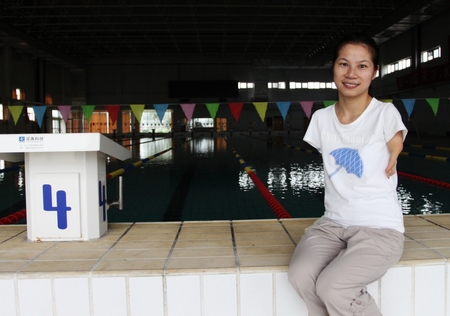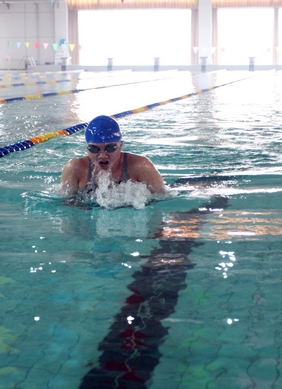Life and Leisure
Kicking up her heels
By Amelia Haselkorn and Lin Qi (China Daily)
Updated: 2010-08-12 14:55
 |
Large Medium Small |
Determination and courage have brought disabled swimmer Jiang Fuying confidence, happiness and a world record. Amelia Haselkorn and Lin Qi report

Jiang Fuying (above) and her fellow athletes (below) of the National Disabled Swimming Team are busy training for the 2010 Paralympic Swimming World Championships at the China Olympic Administration Center for Persons with Disabilities in Beijing. Photos by Liu Zhe / China Daily |
When she was a child, Jiang Fuying wanted to host a radio show. Now the 22-year-old swimmer, who won two medals at the Beijing Paralympics in 2008, hopes she can help other disabled people achieve their dreams by taking up sports.
"I feel a lot of compassion towards other disabled people I meet. I believe participating in sports would bring them both confidence and happiness as it has me," Jiang says, brushing some hair away from her forehead with her underdeveloped left hand.
Jiang was sitting by a swimming pool at the China Olympic Administration Center for Persons with Disabilities, a large complex with beautiful trees and several huge gymnasiums, located on the outskirts of Beijing.
The center enables disabled athletes from across the nation train in a genuine competitive environment.
Jiang and her fellow athletes of the National Disabled Swimming Team were here training for the upcoming 2010 International Paralympic Committee Swimming World Championships. They had an intense schedule everyday, in the water from 8 am to 10 am, followed by a rest and lunch before another session in the pool in the afternoon.
"Often the coaches don't need to tell us what we should work on. We athletes know ourselves better than anyone else and therefore are more responsible for pushing ourselves," Jiang says.
It was a chilly winter morning in 1988, when Jiang was found crying beside a dustbin close to a welfare home for orphans and the elderly in Jinzhou, Hubei province. She was born with phocomelia, a rare malformation, which has left her without a right arm and with an underdeveloped left arm. She was taken in by the welfare home and named "Fuying", which means a baby who would bring the world good luck.
"Since childhood, I have never caved in to difficulties. When I was 5, I tied my body from above the waist to a bicycle and rode with my jaw controlling the balance. I learnt to write with my feet so I could be admitted to an ordinary primary school with no fees," she says.

When Jiang turned 14, recruiters for the national disabled teams came to her school and recognized her as a potential athlete even though she had never swam before.
"At first I didn't believe that I could swim only with my legs. I started out by overcoming my fear of water; and then on the second day, I managed to float on my back and practice with kickboards," Jiang recalls.
Her strength comes from her legs and hips and when working-out she focuses on these, running and lifting weights. She also does a lot of abdominal work.
"The first time I finished swimming dozens of meters, I didn't see myself as an ugly duckling anymore. I felt like an unfettered fish. And all my bad childhood memories of getting teased by ordinary kids melted into the water," she says.
In October 2002, she won three gold medals and one silver medal in her first competition abroad - the Eighth Far East and South Pacific Games for the Disabled in South Korea.
In 2008, she was a torchbearer at the Beijing Paralympics. The organizers suggested that she used a wheelchair, but she insisted on running and bound the torch to her left arm.
Later, in the Water Cube, Jiang won a bronze medal in the 100-meter backstroke. She then won the 50-m butterfly with a new world record .
Jiang now studies radio and television journalism at the Jinzhou-based Yangtze University, striving for her dream of hosting a radio show. She will also compete in the qualifiers for the 2010 London Paralympics.
"For years, I hated my biological parents for abandoning me. Now I don't," Jiang says.
"I want them to know that I enjoy my life. I hope they can see me winning more Paralympic medals in two years."